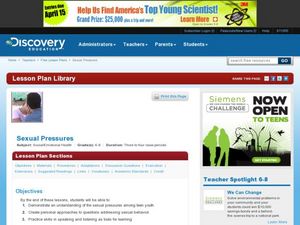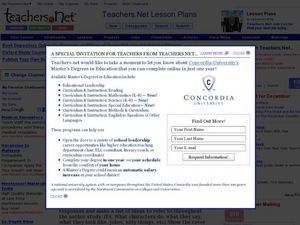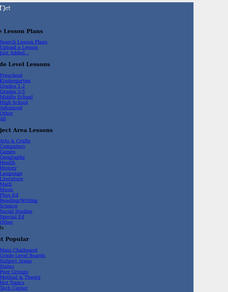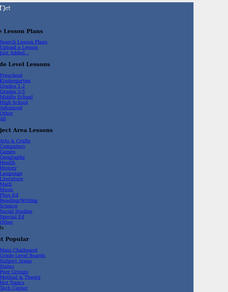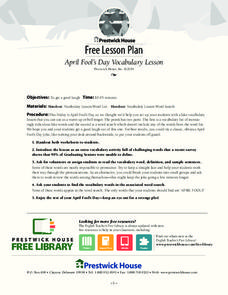Scholastic
Frindle Lesson Plan
"Who says a pen has to be called a pen? Why not call it a frindle?" Inspired by this quote from the award-winning novel written by Andrew Celements, this activity allows children to invent their own...
Curated OER
Direct and Indirect Characterization
How does an author develop his or her characters? Using the short story "On the Bridge" by Todd Strasser, readers study character development by looking for examples of both direct and indirect characterization. They plot these points on...
Curated OER
"Cask of Amontillado" by E.A. Poe Practice Test
Assign this practice test to your ninth graders reading "Cask of Amontillado," by Edgar Allen Poe. They examine the characters, the plot line, the mood, and different themes in the text during this 32-question quiz.
Curated OER
Do You Have a GSOH?
For this humor worksheet, students, with a partner, read and discuss thirteen questions associated with having a good sense of humor and making fun of others.
Curated OER
Sexual Pressures
This instructional activity contains sensitive material, please review to ensure that the content is suitable for your class. Small discussion groups explore ways to establish boundaries, make positive decisions, and respect others when...
Curated OER
Sexual harassment
Students research sexual harassment. In this sexual harassment lesson, students discuss and research sexual harassment. They write a script for a scenario dramatizing the incident, how to respond and or prevent the incident.
Curated OER
Drama Terms Notes
Comedy, tragedy, act, scene, prop. do you want to review important drama terms? Actors record the term next to its definition on a worksheet that could be used individually or as a group activity. A link to a corresponding PowerPoint...
Curated OER
The California Recall Election
Learners identify facts about the structure of the California recall election. They research the history of recall elections throughout the United States. They analyze the positives and negatives of a governor recall election.
Curated OER
Torn from Each Other's Arms
Young scholars consider how the institution of family suffered under slavery. In this slavery lesson, students watch segments of "Slavery and the Making of America". Young scholars examine the structure of the Driggus family and...
Curated OER
Committing Crime or Just Having Fun?
Students breakdown different types of youth crime/gangs. Students evaluate the power of peer pressure. Students identify and offer advice for dealing with peer pressure. Students encounter the theory of phenomena.
Curated OER
"K" Letter Ideas
Learners practice with the letter K and use the Internet to help them expand their usage of "K" words.
Curated OER
Apostrophes - possession
Learners examine the use of apostrophes. From a given reading, students locate all words with apostrophes. Using these words as examples, learners discuss rules for using apostrophes. Students match a person an an object from a list...
Curated OER
Robert Munsch: Author Study
Students study Robert Munsch's style of writing. In this literature lesson, students read many of Robert Munsch's books, write a list of the characteristics found in his books, and write or orally tell a story using...
Curated OER
Frogs and Toads Are Different
Second graders identify the unique characteristics of frogs and toads. Through Internet research and reading the book Frog and Toad are Friends by Arnold Lobel, 2nd graders compare and contrast the two amphibians.
Curated OER
Hot Dog Stand: The Works
Pupils strengthen skills in mathematics, problem solving, and communication skills by working together in groups using "Hot Dog Stand: The Works" educational software.
Curated OER
Shopping for Clothes
Students demonstrate how to request information in a department store. They read and repeat dialogue, role-play with a partner using shopping vocabulary, and write down dictated amounts of money.
Curated OER
Conducting a Functional Behavior Assessment
This is an excellent guideline for an observer to use when conducting an assessment for a student who has a chronic behavior problem. The chart has 3 categories--antecedent, behavior, consequences--and clear examples to guide you.
BrainPOP
U.S. Symbols
United States symbols are the subject of a video brought to you by BrainPop Jr. Hosts, Annie and Moby, begin with a definition of the word symbol, then go on to detail ten American symbols—the American flag, a Bald Eagle, the Liberty...
Curated OER
Student Safety Contract
With spaces for both your science pupils and their parents to sign, this laboratory safety contract is a must-have for your science classes. Twenty-one rules applying to protection and hazard prevention are listed. Discuss them with your...
Curated OER
ASL: Lesson 10
Focus on learning how to sign cardinal and ordinal numbers, nouns, and lexicalized fingerspelling. Here is lesson 10 of the series on learning ASL. Provided, are multiple links that provide a visual guide to proper signing. Teach your...
Prestwick House
April Fool’s Day Vocabulary Lesson
Quandimonium will ensue when the class discovers you will be grading this April Fool's Day vocabulary activity, complete with made-up words and definitions, although the truly perspicacious will remain axomachilliax.
National Park Service
Same Colors, Different Flavors
Who says getting to know your neighbors has to be difficult? The first resource in a three-part series creates an engaging project that teaches your scholars about Canadian culture. A question-and-answer format takes place via e-mail and...
Curated OER
Intolerance in American History
Examine the United States through the lens of intolerance using this 2-week unit plan, which includes details for 13 days of instruction. Scholars study examples of prejudiced behavior throughout history, discuss issues in groups,...






